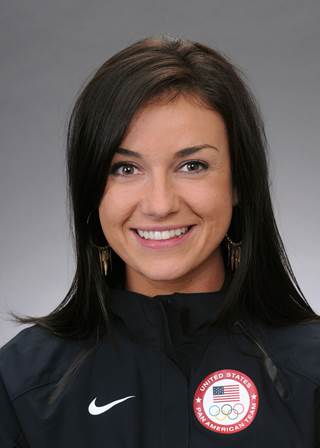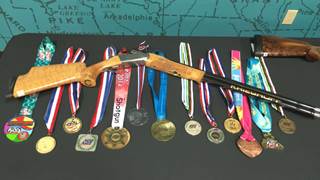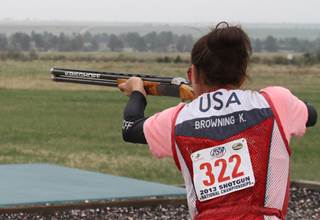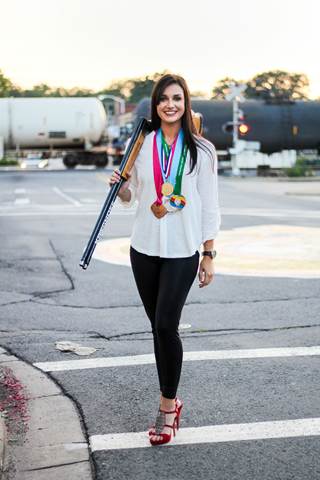Meet U.S. Olympic Trap Shooter Kayle Browning
From duck hunts in the flooded timber to the Olympic Games in Tokyo, this Arkansas native is excited to compete on the world’s biggest stage
From duck hunts in the flooded timber to the Olympic Games in Tokyo, this Arkansas native is excited to compete on the world’s biggest stage

Ducks Unlimited magazine Senior Editor Chris Jennings chatted with Team USA Olympic Trap Shooter Kayle Browning before she took off for Tokyo in mid-July. If you are looking for someone to root for during this years Olympic Games, make it this avid duck hunter from Arkansas.
Listen to the full interview on Ducks Unlimited Podcast

Kayle Browning, 28 years old
Wooster, Arkansas
Ducks Unlimited: How did you get into competitive shooting?
I got started in shooting by my dad. He was a competitive sporting clays shooter, and I pretty much grew up on the shooting range, in and out of competitions with him. He used to fill up water balloons or Coke cans when I was little and let me take a BB gun and shoot them, then watch the water come out. I thought it was the coolest thing ever.
He always made it very fun for me, so I just kind of followed in his footsteps with competitive shooting, as well as hunting. I mean he would always take me on bird hunts and duck hunts, and just always made the experience very fun for me, so that kind of lit the fire for me at a really young age. Then, when I was 14, I found out that shooting was an Olympic sport. I thought, What? Shooting is in the Olympics?
I thought, obviously I have to go that route. That's a no-brainer. So I made the switch over to international trap, and it's kind of just history from there.
What gun do you shoot in competition?
I shoot a Krieghoff, and it is a K-80 12-gauge. I've shot the same gunwell, it's a little bit different now that I switched my barrels outbut I've shot Krieghoff since I was 15. They are one of my very first sponsors. They've been with me the longest, or I've been with them the longest. It's a German-made gun, and it is totally set up for trap. If you saw my competition gun, you would think that you could only shoot trap with it. And you would be 100 percent right. It's totally custom made.
It has 32-inch barrels, which is a little bit of a stretch for a girl, but I like the weight, and I like how the barrels point. I just think they're a little bit more accurate, and they balance out the gun for how I have it set up.

What gun are you shooting in the duck woods?
I use a Beretta A400 Xtreme. I am the queen of falling in the water, whether it is tripping over a tree root, or like down at our place, we have a bunch of beaver runs, so I'm notorious for hitting a beaver run while I'm trying to set everything up. That gun has taken a swim quite often and it's still going. I need a gun that can take the abuse.
What led you to the Olympics and what have you learned from that process?
Yeah, it was a wake-up call for me because, previously, I would just shoot for fun, and I would practice for fun. It had always been a really fun experience, and then when I made my first World Cup Team, I quickly realized that I was competing against the best people in the world. I had to take that for what it was, and as serious as it was.
At a young age I gave up basketball camps. I was really active in school sports, so I would give up summer camps and spend the weekends training, waking up at 7:00 or 8:00 a.m., which is a lot for a 15-year-old. They want to sleep in until 10:00. I was waking up early, shooting, and training. I also had a job when I was 15 to help my parents pay for targets, ammo, training trips, shoots, and stuff like that.
I learned that work ethic and dedication from a really young age, and I'm really thankful for that now because it was always my choice to do that. My parents always supported me in it. It's paid off. I now have the title of an Olympian, nobody can ever take that away from me, and I know it was well earned.
Explain how international trap competitions work. What are the shots youll typically be making at the Olympics?
We call it bunker trap. It's international bunker trap. Basically, the difference from American trap, which is what most people are familiar with, is that international trap is a 60-foot underground bunker that has 15 trap machines underneath it. Each station, 1 through 5, has three set machines per station. There's a designated left, right, and straightaway, and those are all kind of random throughout the game, so you're going to get two lefts, two rights, and one straightaway off each station. Angles are a lot harder and speeds are a lot faster. The angles can go all the way from 45 degrees left to 45 degrees right, and up to three meters high. They're set to a distance so the speeds are going to vary on those, whereas in ATA trap, you have a rotating machine under just one bunker, just one machine.
You do get two shots in this game, which you definitely need because on average, the targets are going 68 to 70 miles per hour, versus ATA, where they're about 38 to 40 miles per hour. It's a really fast game.

Tell us about your waterfowl hunting experience.
I started hunting before I started competition shooting, and I can give thanks to my dad because he is an avid hunter. We actually have some flooded cypress, and I basically live on the land that we hunt, so I grew up hunting flooded timber. I didn't know there was any other way to duck hunt until I got into my teenage years and somebody asked me if I wanted to go hunt ducks in a field.
I was like, What? I grew up so spoiled on duck hunting in flooded timber, and I started when I was really young. Thats what attracted me most to duck hunting: waking up early, going out there, and all the prep work that you have to do for duck hunting, because it is challenging.
I think what really attracts me to duck hunting is the experiences that I've had with my dad. It's kind of sentimental. It's something that we've done every year, all season long, since I can remember.
Now, I've gotten my own dogs, and got them all trained, so it's really fun for me to watch the dogs work, and watch it click for the dogs why they're out there, and why they've been training for so long.
It's not necessarily the harvest that attracted me; it's just the whole experience. Getting to go with your friends and your family, learning how to duck call, learning the language that the ducks speak and being able to call the ducks in, and then, of course, you make good shots on ducks and then you can watch your dogs work. It's just the whole experience.
What would you tell someone who might be interested in getting involved in competitive shooting?
I would say the best thing to do is to find somebody that you trust, or somebody that's at a little bit of a high level like a coach, or an athlete that's been down that road, and just reach out to them and say, "Hey, this is my first time shooting. I would really love any advice you could give me, or where do I start?" The one piece of advice that I would say is you're never too old, or I mean, I guess you can kind of be too young, but I started when I was eight years old, so you're never too old to pick up a gun and learn how to use it.
You look at these different sports like gymnastics and they pretty much have an age cut off. I mean, many of them peak when they're like 16 or 17. Also, not just anybody can jump on a balance beam and flip around. Most people can pick up a gun and, when you're in the right hands, somebody can show you the proper way to hit a target and it becomes really fun. It's not as intimidating as people might think.
The best advice is to reach out to somebody, and just ask for help, or go to your local gun club and just start doing it. The biggest thing is just to go out there and do it, and experience it, and then when you decide, "Hey, I really like this," then just reach out to somebody for coaching.
What aspect of the Olympic Games are you most looking forward to?
Probably the biggest thing I'm looking forward to is the challenge for myself. If you just sit here and think, Wow, you're about to compete in the Olympics, that can be a little bit nerve-racking, so I'm really excited to get over there and just have the whole experience, represent my country, and take it for what it is. Ill try not to put too much pressure on myself and just do the best that I can do, and hope that leads to a medal.

Ducks Unlimited uses cookies to enhance your browsing experience, optimize site functionality, analyze traffic, and deliver personalized advertising through third parties. By continuing to use this site, you agree to our use of cookies. View Privacy Policy